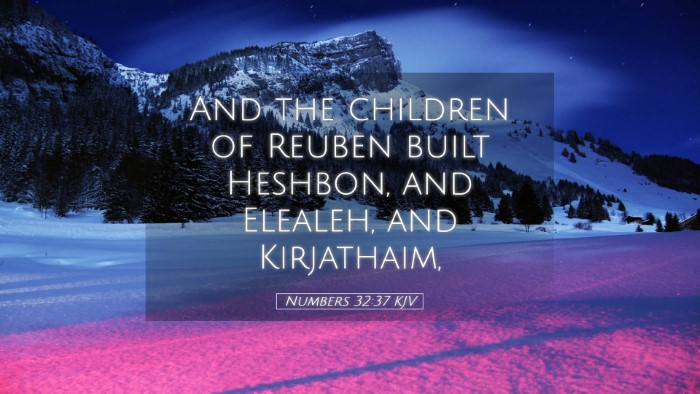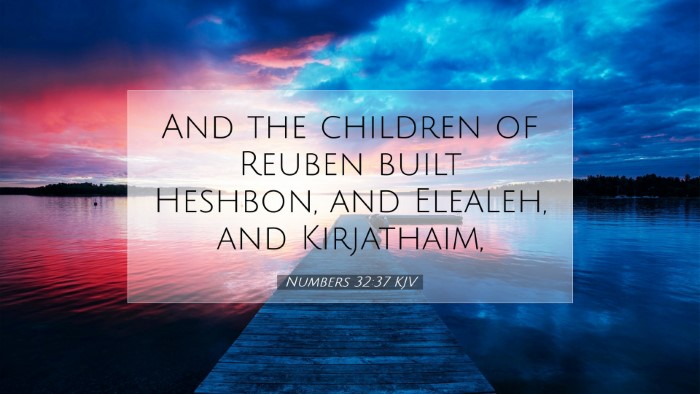Commentary on Numbers 32:37
Bible Verse: Numbers 32:37 - "And the children of Reuben built Heshbon and Elealeh and Kirjathaim."
Introduction
The verse encapsulates a significant moment in Israel's history, particularly for the tribe of Reuben. Each action by the Israelites at this stage carries theological and practical implications for their journey. The construction of cities such as Heshbon serves as a backdrop for discussions about land, identity, and covenantal fidelity.
Contextual Analysis
Before delving into the specifics of the verse, it is crucial to understand the broader context of Numbers 32. The Israelites were on the cusp of entering the Promised Land, and various tribes were contemplating their inheritance. The tribes of Reuben and Gad, along with part of Manasseh, requested land on the eastern side of the Jordan River, which prompted a significant negotiation with Moses and the leaders of Israel.
Moses' Response
Moses' reaction to the Reubenites' request is pivotal. He challenges their intentions, invoking concerns about abandoning their brethren in the conquest of Canaan. His admonition highlights the themes of communal responsibility and faithfulness to God's promises. The commentary by Matthew Henry addresses this aspect vividly, emphasizing that true obedience often requires sacrifices and considerations of others’ welfare.
Analysis of Key Elements
-
The Act of Building:
The children of Reuben took the initiative to build cities, which illustrates self-governance and a desire to establish a presence in their chosen land. Adam Clarke notes that the names of these cities—Heshbon, Elealeh, and Kirjathaim—hold historical and theological weight. Heshbon, for example, was formerly the city of Sihon, which underscores the victory of Israel over their enemies.
-
The Names of the Cities:
Mentioning these cities suggests more than just geographical markers; they signify a claim to heritage and identity. Albert Barnes remarks that each city's name could reflect the culture and history of the Reubenites, incorporating indigenous traditions into their new life within God's promises.
-
Symbolism of Land and Promise:
The construction of cities was also a symbolic act of claiming God's promises. The Reubenites' decision to settle outside the Promised Land posed theological questions about the nature of God's covenant. What does it mean to live in the fullness of God's promises yet choose a land that may not be His ultimate gift? Henry's commentary suggests this duality is critical, highlighting how believers today grapple with material versus spiritual inheritance.
Theological Implications
From a theological standpoint, the decisions made by Reuben and his tribe reflect broader tendencies in human nature regarding comfort, compromise, and commitment to the divine calling. Numbers 32:37 is a reminder of the human inclination to settle for what is immediate and tangible rather than waiting for God's full plan to unfold.
Spiritual Lessons
The building of cities can be seen as a metaphor for what believers construct in their lives. Adam Clarke emphasizes the need for spiritual diligence—what are we building? Are we establishing foundations rooted in faith, or are we erecting walls that separate us from a fuller relationship with God? This tension invites pastors and theologians to reflect on their congregations: are they leading their communities towards deeper commitments to God, or are they content with surface-level engagements?
Application for Modern Believers
The lessons from Numbers 32:37 extend beyond ancient Israel. Today’s Christians must grapple with similar questions of land, identity, and faithfulness. The choices made by the Reubenites force us to evaluate our own priorities and alignments. Will we settle for less than God's best in our lives and ministries?
Encouragement for Action
- Pursuing God’s Best: Believers are called to seek after God’s promises fully. The Reubenites had the unique opportunity to conquer the land westward but chose comfort. Do we mirror this tendency in our spiritual journeys?
- Collective Responsibility: Just as Moses reminded the Reubenites of their obligation to their fellow Israelites, we must consider how our choices affect our communities and families. Responsibility is a vital theme in the Christian faith.
- Identity in Christ: The Reubenites' settlement outside the Promised Land begs the question: where is our true inheritance? As believers, our identity lies in being children of God, heirs of the promise. This spiritual reality demands reflection and action.
Conclusion
Numbers 32:37 serves as an enlightening passage, framed within a narrative of choice, identity, and community. By examining the implications of the Reubenites' actions and drawing from the insights of esteemed commentators like Matthew Henry, Adam Clarke, and Albert Barnes, modern-day readers are challenged to reflect on their walk with God. As we build our lives—taking steps towards our own “Heshbon, Elealeh, and Kirjathaim”—may we strive to build not just for ourselves, but in a manner that honors our commitments to God and each other.


